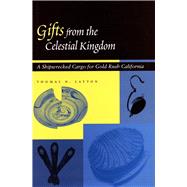Gifts from the Celestial Kingdom: A Shipwrecked Cargo for Gold Rush California
, by Layton, Thomas N.- ISBN: 9780804746915 | 0804746915
- Cover: Paperback
- Copyright: 8/1/2002
In a prior volume--The Voyage of the "Frolic": New England Merchants and the Opium Trade(Stanford, 1997)--historical archaeologist Thomas N. Laytontold the story of his excavation of an ancient Pomo Indian village site in Northern California, where, to his surprise, he recovered Chinese porcelain potsherds. Tracing those sherds to a beach on the rugged Mendocino coast, he then followed them out to the submerged remains of theFrolic, a sailing vessel wrecked in the summer of 1850 with a rich cargo of Chinese goods bound for Gold Rush San Francisco. In that volume, Layton used the vessel's earlier role, transporting opium from Bombay to Canton, as a vehicle to tell the story of American participation in the opium trade. Although theFrolic's career as an opium clipper was ended in 1849 by the introduction of steam vessels, the almost simultaneous discovery of gold in California suddenly created enough purchasing power to support direct commerce with China--and thus a new career for theFrolic. In this sequel volume, Layton has two objectives. First, he employs theFrolic's ill-fated first, and final, cargo to San Francisco to tell the broader story of the beginnings of direct commerce between China and California. Second, he attempts to explore the potential of contextual archaeology--the intellectual process of "transporting" artifacts from their resting places back to the behavioral contexts in which they once functioned. Layton accomplishes his objectives by describing the full trajectory of theFrolic's final cargo from four different perspectives: from that of John Hurd Everett, the California merchant who assembled the cargo in China; then from the perspectives of the sailors and Pomo Indians who pillaged the cargo immediately after the wreck; then through the eyes of twentieth-century sport divers who plundered it yet again; then, finally, through Layton's scientific perspective as an archaeologist. To augment his quest for context, he employs carefully documented vignettes to fill the interstices between the facts. Throughout, he discusses his research--replete with visits to archives and antique shops--and in so doing introduces readers to the practice of modern historical archaeology.






